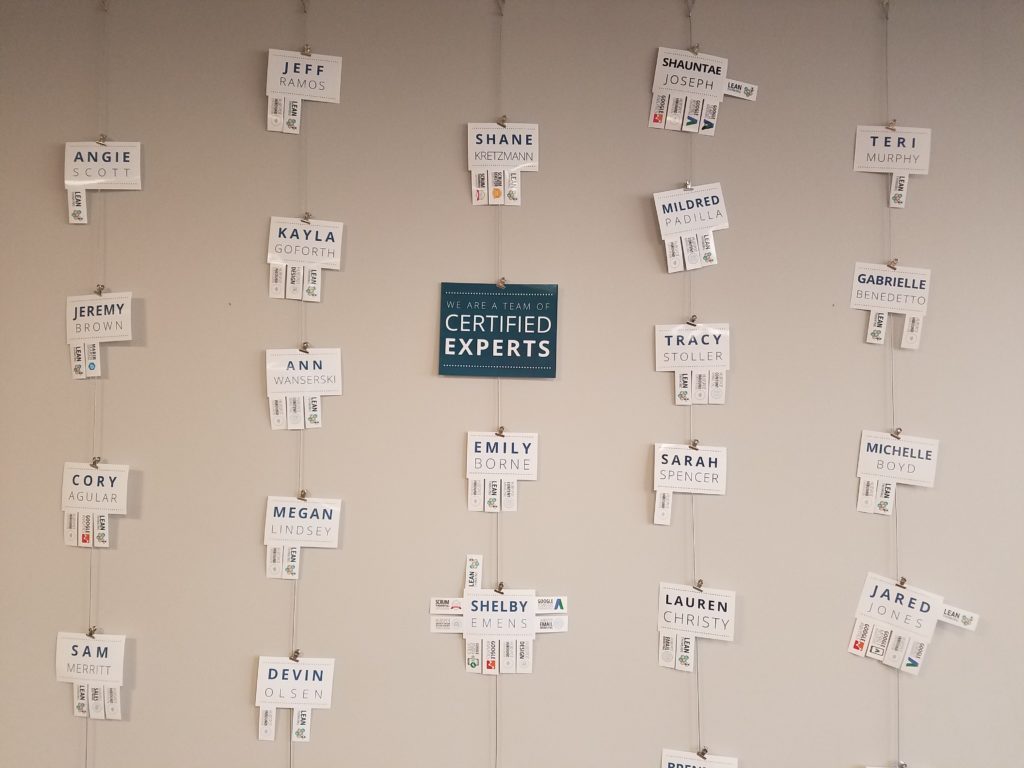7 Qualities of an Effective Marketing Agency (and How to Test for Them)
December 11th, 2018 by


I often joke that, in digital marketing, you’re an expert if you know more than the person you’re selling to. This was recently brought home to me while attending a startup conference: a member of the photography team, who was still an undergraduate in college, said he hoped to open a marketing agency upon graduation.
This may seem like shocking hubris to anyone who’s been in the industry for any length of time, but many customers, especially smaller businesses, don’t understand the value of experience. They presume instead that since the marketing is digital, youth is a qualification in and of itself.
We know, however, that regardless of the industry, experience improves effectiveness. I’m sure we’d all rather have an experienced mechanic, doctor, or plumber, and that experience—i.e. a bigger pool of knowledge on which to draw—helps assure they’re not misdiagnosing or reinventing a perfectly good wheel.
When thinking about which agency to choose, we thought it would be helpful to break down the decision-making into a number of key areas.
We’ve also put together a printable checklist for you when you do get into the decision-making process.
Fit


Company Culture
At Search Influence, we use the acronym “CHARGED” to define our values. We live these values every day, and they are reinforced in our office, our incentives, and our hiring. In fact, even our employee assessments are based, to some extent, on how CHARGED the employee is. You can read more about our CHARGED values and how we came to them.
Team
Whether they are executives empowered with maintaining this strategic relationship or line employees executing the deliverables, it’s important you have confidence in your team.
Because Search Influence started at a time when there were few available educational resources, we’ve developed extensive training internally. We also take advantage of best-of-breed third-party resources—mostly from our vendors, like Google, HubSpot, and Facebook.
And finally, for the team which will be working on your account, who are they? What’s their experience level? Who are they supported by?
Contacts
On a day-to-day basis, who will be managing your account, and how are they supported? Do you know who their manager is? Do you have access to leadership in the company?
We make a point of having our Team Leads and our Director of Account Management reach out to new clients to assure they know whom they can go to if they need more support.
Qualifications
Areas of Specialty
One of the challenges of smaller agencies is that they either have to be a Jack & Jill of all trades or they have to outsource specialized skills. It’s easy enough to claim to be an expert in content marketing or paid search, but these fields are richly nuanced and oftentimes require years of study to execute well.


Certifications
On the topic of specialization, certifications are a great way to prove knowledge in a given area. When the bar is so low to call oneself an expert or even an agency, it’s important to have evidentiary proof. Certifications are a great tool for that proof.
Speaking and Publishing
There’s no greater proof than the peer review required for both speaking and publishing. Our team members speak regularly to audiences in both digital marketing and in the industries of the clients that we serve.
We are complimented when asked to share our knowledge from both the podium and in other media. Equally instructive as the thought leadership of an agency are their publications, whether written or via interview, in educational resources like blogs and podcasts.
Process
Processes
Every account and engagement requires a unique approach. Within those unique strategies, there are naturally a number of repeated tasks. If an agency doesn’t have processes for common practices, there is a lot of wasted effort.
Search Influence’s early years included supporting very large partners like Yodle and Advance Digital. We had to think about how we execute more than most agencies. When you are called upon to produce tens of thousands of pieces of content per month, you need a process. Our clients, even the most creative, benefit from our process-focused approach.
Internal Communication
We’ve heard the horror stories of traditional agencies and their “Job Jacket”—in essence, a folder that moves from department to department. While multitasking may not be all it’s cracked up to be, there are plenty of times when teams have to work in parallel to deliver work.
As a nearly 13-year-old agency, we’ve had a lot of time to develop both processes and software systems to support the many stakeholders in delivery. Some of our systems are custom and some use modified open-source software. At any time, we can see both where a project is in the process and what’s left to be delivered.


External Communication
“What have you done for me lately?” is a common refrain in the service industry. As an agency, we are most responsible for answering that question to our clients.
Nearly a decade ago, we realized there was too much data to manually report, and we built a platform that pulls analytics, leads, and advertising effectiveness into one seamless interface. Our platform and our processes have ingrained a practice of monthly review and report that helps both our internal team and our client teams focus on the metrics that matter.
The Challenger Agency
Can You Learn From Them?
In The Challenger Sale, Matthew Dixon and Brent Adamson show us that the best salespeople know as much, or more, than their prospects about their target industry.
One of the benefits we can bring to our clients is to educate them about their own industry from our perspective, working with a number of their peers. Face it, when you’re head-down in your business, it is not always easy to keep on top of trends and industry news.


Do They Push You?
It’s OK. We all get comfortable doing the same old thing.
A great marketing agency should push you. Sometimes the ideas we bring make our clients a little uncomfortable. Especially in traditional, conservative industries, or in those where there’s been a recent leadership transition, it can be hard to take on initiatives that feel risky or out of character.
Einstein is often attributed with the saying, “The definition of insanity is doing the same thing over and over and expecting different results.” But you may know it more accurately as, “Do the same things, and expect the same results.”
Are They Experts?
Google says an expert is “a person who has a comprehensive and authoritative knowledge of or skill in a particular area.”
This is hard to test for. How do you know it’s comprehensive? How do you know it’s authoritative? Ultimately, unless one is also an expert in a particular area, one must look to third-party endorsements and results.
We are fortunate at Search Influence to have a number of industry authorities who refer us business and will vouch for the quality of our work. We also have a number of clients who credit us with their business success. Hopefully, any agency you’re thinking of hiring can say the same.
Industry Variety
Broad Experience
Entrenchment in an industry is not necessarily the same as specialization. And specialization may not equal expertise.


In order to have the broadest view of our craft, we need to see how it is executed in multiple industries. Pioneers make discoveries and are often on the fringe. As such, it benefits all of our clients that some of them are in niche industries that call for new, creative tactics.
Adjacent Industries
Medicine offers great examples of the value of adjacency. Historically, some areas of medicine have been less likely to be eligible for insurance reimbursement. These “cash” specialties have had a greater incentive to be pioneering in marketing as a whole.
Examples of leading-edge specialties in the medical industry include plastic surgery and weight loss surgery. The medical industry has changed, and we now know that most practitioners need to consider the impact of marketing—most especially ratings and reviews.
Your Industry
It’s great if the agency you’re vetting knows your industry directly. You will likely save some time educating them.
That said, people are people and marketing is about people first. We don’t need to have worked in your exact industry to be able to drive customers through your doors.
Confidentiality
Contractual Confidentiality
Even if your industry doesn’t mandate confidentiality, you certainly don’t want your business on the streets.
With over a decade in highly regulated industries, not to mention being responsible for thousands of OPCs (other people’s clients), we take confidentiality very seriously and even include it in our contracts. Even with our contracts, we’re sometimes asked to sign a non-disclosure agreement, and we’re happy to do so.
Data Security
Nobody is immune to a data breach. Some of the biggest names in industry, including Target, Macy’s, and many more, have been affected.
What most don’t know is that some of these cases are the result of sloppy data management by vendors. In the case of Target, the breach occurred when hackers used a third-party HVAC provider’s stolen credentials to break through from a “billing, contract submission, and project management” platform.
Employee Confidentiality
Many misunderstand the intent of employment agreements. A key component of the agreement every Search Influence employee signs is client confidentiality. We have access to sensitive business details of our clients and it is critical our employees understand their role in that.
In many cases, especially in law and medicine, we have a legal responsibility to protect not just our client’s information, but their clients’ and patients’ as well.
Results
Tracking/Reporting
John Wanamaker (1838-1922) is credited with the now-famous phrase, “Half the money I spend on advertising is wasted; the trouble is I don’t know which half.”
The sad part is that many agencies still survive on the wrong half of that equation. It’s understandable. Quantifying the impact of ad spending on- or offline is hard. There are many factors that affect a customer along their path to purchase.
We see it as our job to identify which half is wasted and to stop it!
And to put our money where our mouth is, we invest in assuring that our team members are experts in a number of analytics packages through third-party training, as well as on the job. If you want proof, ask about our certifications.
Metrics That Matter
Reports suck. The main reason reports suck is that most of them don’t tell you what you really want to know. We find that, for each campaign, there are usually only a few metrics that matter and the rest is noise.
We try to work closely with our clients to understand their goals, and from those goals, to understand what metrics will show we’re on track.


ROI
It’s hard to believe, but some agencies don’t understand that marketing is an investment. A defining characteristic of an investment is that one should expect a return.
In other words, how does a dollar spent lead to many dollars earned? We believe marketing has to earn its place in the budget. The way we do that is by making marketing accountable to dollars earned.
If your prospective agency isn’t comfortable talking about how they will make you money, walk away.
And call us.
Search Influence takes pride in exhibiting our CHARGED values. Start a conversation today by calling (504) 881-1597.
Images:


Your post is wonderful and full of relevant tips that will help me a lot. Thank you!